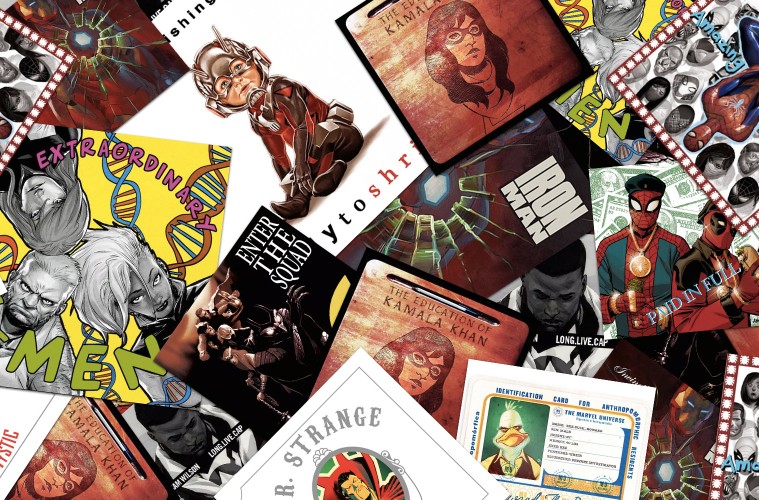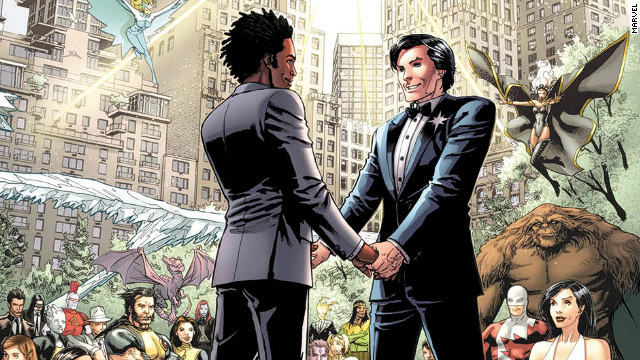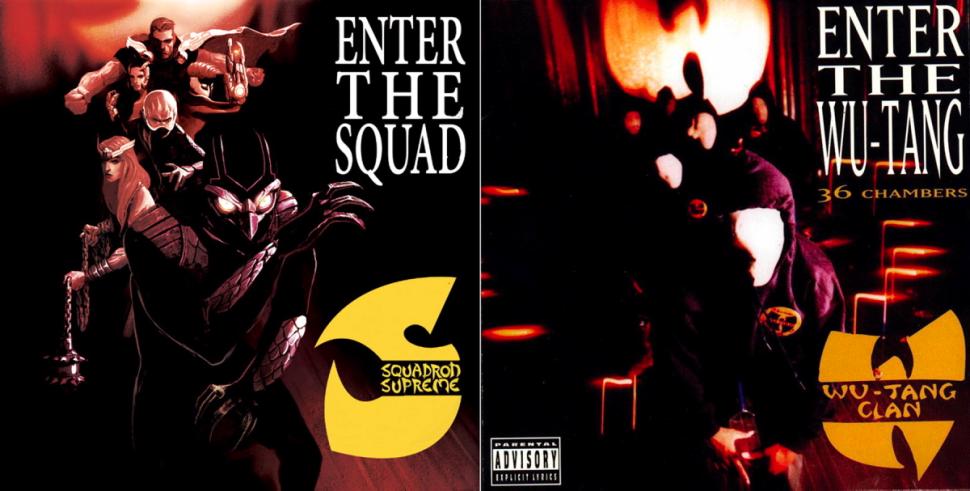 Some people have taken the phrase “Wu-Tang Clan Ain’t Nuttin to F Wit'” too literally.
Some people have taken the phrase “Wu-Tang Clan Ain’t Nuttin to F Wit'” too literally.
Since first reading a comic book in full over two decades ago, one thing I noticed was how the dialogue for several Black characters was written. In the early to mid-1990s, the majority of such characters were conceived of by White writers and artists. These characters’ dialogue was proper, for lack of a better expression. The dialogue and even the thought bubbles were devoid of African-American English or anything phonetic. As I grew older, I found the creators’ choice in this matter to be a peculiar one. I suppose they did this in an attempt to avoid upsetting any readers of color who could have had cried foul about stereotypical characters. But a Black character talking broken English with slang would’ve been just as true-to-life for me as the character’s Bougie counterpart. To take it a step further, I have frequently posited a connection between comic book culture and aspects of Black American culture, specifically hip-hop.
While the connection is more one-sided than anything else, with hip-hop artists frequently sifting through comic book mythology for qualities that can be incorporated into their own musical art form, people are starting to take notice of said connection. Marvel Comics recently commissioned artists to create mash-ups of Marvel characters with classic hip-hop albums. The promotion is to use the publication’s characters to pay homage to the genre’s most classic albums. I myself am in favor of the idea and have been eager for the fruits of this promotion, viewing it all with a mound of humor and reverence as a fan who’s steeped in both cultures.
However, as with anything, this promotion has its share of critics who have eagerly decided play the race card.
One article I read last week on the website for Women Write About Comics, entitled “Marvel Announces Hip-Hop Variants for October, Still Does Not Care About Black People”, suggests that this promotion proves that Marvel Comics is a giant cultural appropriator. Similar to the practices of clothing designer company Abercrombie & Fitch, Marvel seeks to perpetuate White supremacy. How? By building and maintaining a market that essentially screams, “NO COLOREDS ALLOWED” and by appropriating Black culture for its own benefit. Mind you, I’m paraphrasing the article’s contents.
The writer, J.A. Micheline, is a woman of African-American descent and her vexation stems from her belief that hip-hop at its core, is about speaking on the racial injustices dealt on Black people. Marvel Comics, according to her, is devaluing that culture (and thus all Black people, in effect) through their tributes. She believes that predominantly White creator teams in the company are responsible for the massive proliferation of White characters. She used DC Comics as a counterpoint to illustrate Marvel’s “error”, citing that they have at least one Black writer on staff.
I disagree with her stance because I believe it’s written out of paranoia and hyperbolic anger. She speaks as though Marvel Comics believes Black people have their place, just not on Marvel’s level. The biggest flaw is that her article includes only three examples of covers that she believes validate her point: Squirrel Girl’s homage to “Wolf” by Tyler, the Creator; Iron Man’s mash-up with 50 Cent’s “Get Rich or Die Tryin’”; and Spider-Man & Deadpool’s cover of “Paid In Full” by Eric B. & Rakim. She conveniently failed to mention that among all of the covers released thus far, two actually use Black characters for their covers.
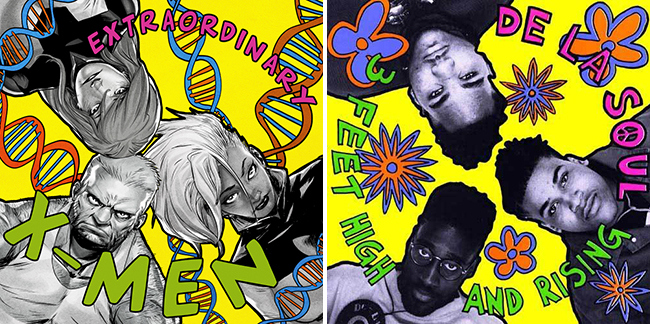
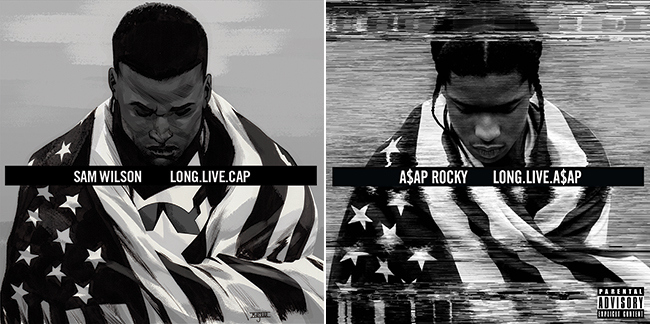 See? Black Characters fully utilized.
See? Black Characters fully utilized.
The X-Men (including Storm, a prominent Black Character in Marvel for over 40 years) give their take on De La Soul’s “3 Feet High & Rising” while the Falcon (the first African-American character created by Marvel during the 1960’s) pays homage to “Long.Live.A$AP” by A$AP Rocky. While Marvel is clearly trying to get paid, and draw in some readers in the process, there’s nothing race-related about their intentions. I can see how some can perceive it in that manner, but Ms. Micheline’s arguments are seriously discredited given her omission of pertinent facts and the enthusiasm by which she conveys her own speculations about Marvel’s alleged racist agenda. Moreover, hip-hop was created as an art form by inner-city Blacks. Though racial issues have always been at the culture’s core, the music has become more than that. Many artists rap about topics of substance other than race however they choose. For her to claim that it’s just about race proves that she’s not an actual fan of the music nor does she understand it like a true listener would.
The Guardian’s Noah Berlatsky published a similar article yesterday entitled “Marvel’s hip-hop tribute embraces black metaphors but excludes black people” . His contention is basically that since Marvel characters have been predominantly created by White artists throughout the company’s history, the company therefore has no business making these album cover homages to a Black art form. Like Ms. Micheline, he cites the racial makeover of Ms. Marvel as minimal sign of progress, if at all. He also misses the point about the relationship between both cultures.
He claims that Marvel is doing this “…for profit, with no-doubt rare variant covers to be sold at a mark-up to an audience that often does not include the people these albums were created by).” He acknowledges before this that there is a connection between comics and hip-hop, citing examples of how the Wu-Tang Clan uses aliases derived from Marvel characters. Then he says that comic book audiences don’t include the people who created the musical template for the homages. Clearly, he doesn’t listen artists like MF Doom, someone whose gimmick is based on a Marvel super-villain. Someone who makes beats that sample of old Marvel cartoons. Someone who makes obscure Marvel references in his rhymes. Does Doom not count because his character likeness is that of a White villain? If he listened to more hip-hop, he’d hear what I and many other listeners know. He also claims that the Ant-Man cover of “Ready to Die” by the Notorious B.I.G. cheapens the original album. He misunderstands the point and, by doing so, he’s cheapening hip-hop by likening it to a sacred cow. Thinking of the music with such racially-filled sacrosanct reverence gives it the same “off-limits”, free-from-parody status that the media has zealously afforded to some with double standards. I don’t believe the covers to be parodies or satire, but I do believe that nothing is fair game and everything is open to equal-opportunity.
The Marvel editor behind this promotion, Tom Brevoort, has been a target of the authors’ bile. In his own defense, he’s stated that the hip-hop covers are basically all love and don’t say anything about the racial demographics of Marvel’s creative teams. People can love or hate the covers, but coupling that hate with race-baiting is just dumb.
Comic books are widely fantasy and can be apt metaphors for real world occurrences. One example where those occurrences coalesced was a few years ago in the 51st issue of the Marvel Comics title “Astonishing X-Men”:
The centerpiece of the story was an X-Men character named Northstar (possibly the publication’s first openly gay character) marrying his longtime boyfriend. The groom & groom were opposites: One’s an African-American human male while the other is White French Canadian mutant male. All most readers saw was a gay marriage. Very few, if any, acknowledged that the wedding had interracial and inter-species shades as well.
In closing, both articles are speculative and sorely lacking in factual merit. The contents of both do not extend beyond racial conjecture and are the excrementitious products of two individuals who have no real understanding of the link between hip-hop and comic books.
Action A Go Go on Twitter and Instagram |Be sure to leave your thoughts in the comments section!
Sy L. Shackleford is a jack-of-all-trades columnist for Action A Go Go. A University of Connecticut graduate with a degree in both psychology and communication sciences, he is a walking encyclopedic repository for all things Marvel Comics, movies, hip-hop, et. al. You can follow him on Twitter @shack_house83.
The views and commentaries expressed on these pages are solely those of their authors and are not necessarily either shared or endorsed by ActionAGoGo.com.

